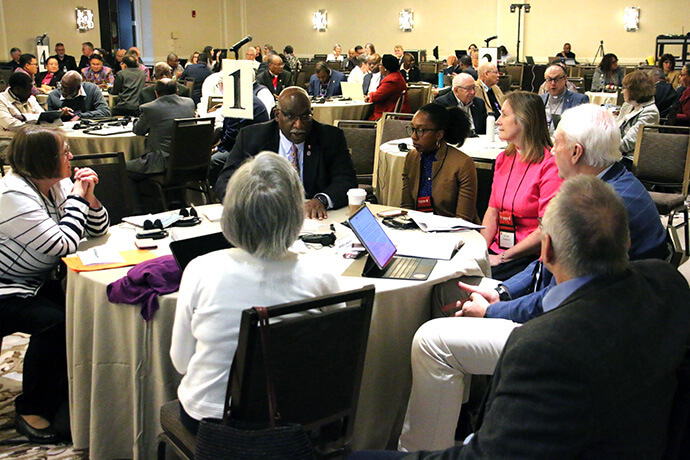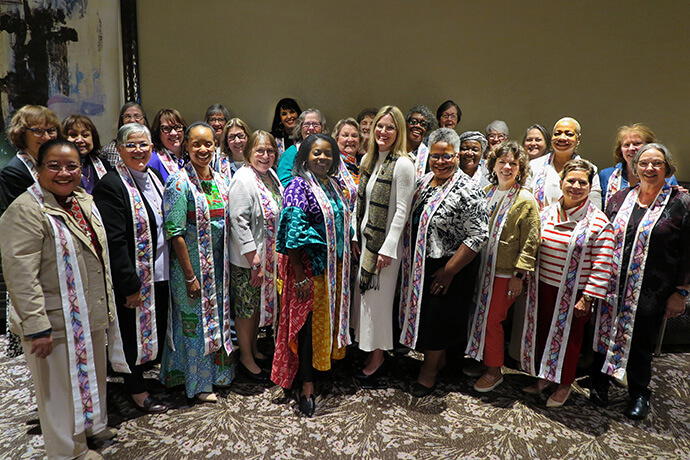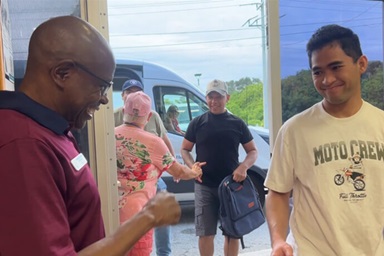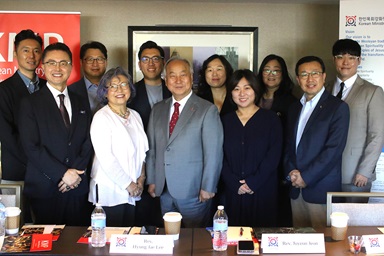Key Points:
- United Methodist bishops are trying to model their new vision for the denomination.
- Their meeting looked at loving boldly through embracing the Nicene Creed.
- They received a report about how United Methodists serve among immigrant populations.
- They also looked to empower lay and clergy leadership in resisting evil, injustice and oppression.
At the same meeting where they unveiled a new vision for The United Methodist Church, the denomination’s bishops explored how to live into that vision.
Council of Bishops President Tracy S. Malone emphasized that vision during closing worship for the April 27-May 2 meeting.
“We are The United Methodist Church,” she said, “who forms disciples of Jesus Christ who, empowered by the Holy Spirit, love boldly, serve joyfully and lead courageously in local communities and worldwide connections.”
As part of putting those words into action, the bishops delved into loving God across denominational boundaries, serving immigrant neighbors under threat and empowering fellow United Methodists to lead.

Loving through the Nicene Creed
One way United Methodists love boldly is through maintaining strong relationships across religious lines.
United Methodist bishops took a step toward strengthening ties within the diverse Christian family by asking for church leaders to revisit adding the Nicene Creed to the Book of Discipline, the denomination’s governing document.
The bishops’ move comes as Christians around the world mark the 1700th anniversary of an important milestone in unifying the faith — the Council of Nicaea.
Leading for the challenges ahead
On May 7, the bishops also released four letters aimed at bearing prophetic witness and following the United Methodist baptismal vows to “resist evil, injustice, and oppression in whatever forms they present themselves.”
Those letters are:
- A Call for Peace in the Democratic Republic of Congo, noting that the bishops grieve the violence and humanitarian crisis in Congo and that they stand with their Congolese siblings in their plea for peace and restoration.
- A Plea for Ceasefire and Justice in Palestine and Israel, lamenting the suffering of Palestinians and Israelis, urging an immediate ceasefire, the protection of all civilians and a just peace rooted in dignity for all.
- A Call to Reject Violence Against Transgender Persons, denouncing all forms of violence and discrimination against transgender people, affirming their sacred worth and calling the church to deeper compassion and understanding.
- A Stand Against the Dismantling of Diversity, Equity and Inclusion Policies, rejecting efforts to erase the progress made toward justice and inclusion, affirming that every person’s story and history are valuable and matter to God and to United Methodists.
“We acknowledge that these letters may challenge, comfort or unsettle you,” said Council of Bishops President Tracy S. Malone in the press release. “Yet, as a worldwide church, we are called to holy conversation — to wrestle together, to learn from one another, and to seek the Spirit’s guidance in community.”
Read press release.
This first ecumenical council in A.D. 325 aimed to resolve differences about the nature of Christ and set a uniform date for the celebration of Christ’s resurrection.
Working on a uniform Christian calendar remains a work in progress, though this year’s Eastern and Western observances of Easter happen to coincide. The Council of Nicaea, nevertheless, did succeed in agreeing on Christ’s divinity — ultimately leading to the creation of what became the first part of the Nicene Creed. This is the oldest Christian creed.
However, agreement on the last part of the Nicene Creed hit a snag in the 500s when Christians in the Latin-speaking tradition began saying that the Holy Spirit proceeds both “from the Father and the Son.” The creed’s original version said the Holy Spirit proceeded from the Father, but made no mention of the Son, and Eastern Orthodox Christians still do not include the phrase today.
What became known as the Filioque dispute (from the Latin for “and the son”) ended up playing a role in the Great Schism that split Western and Eastern Christians in 1054.
With all that history in mind, Bishop Christian Alsted — the outgoing leader of the Nordic-Baltic-Ukraine Area — made a motion for the bishops’ ecumenical officers as well as United Methodist Faith and Order leaders to work on a petition to bring to the next General Conference in 2028 that would add the Nicene Creed to the Discipline.
He also asked that the leaders consider removing the contentious “and the son” phrase from United Methodist use of the creed to be more in line with Eastern Orthodox Christians.
General Conference in 2016 and 2024 did not support petitions to add the Nicene Creed to the doctrinal standards in the Book of Discipline.
That may be, in part, because The United Methodist Church has never before revised its doctrinal standards, which fall under the Discipline’s restrictive rules. Making such a change faces a higher bar than even amending the denomination’s constitution — requiring the support of at least two-thirds of the delegates at General Conference and three-fourths of all voters in the denomination’s annual conferences.
Bishop Mande Muyombo pointed out that John Wesley, Methodism's founder, cut mention of the Nicene Creed from the Articles of Religion that became the basis of The United Methodist Church’s doctrinal standards.
“He still included it in the ritual for Holy Communion, suggesting that he valued it as a way to affirm the Christian faith,” Muyombo said.
The bishop leads the North Katanga Area that encompasses both Tanzania and parts of Congo. He and other bishops noted that the United Methodist Hymnal includes the Nicene Creed.
“This will require some deep teachings and awareness, so that when it comes to General Conference, it doesn’t become controversial,” he said.
Bishop David Bard chairs both the denomination’s Committee on Faith and Order as well as the Council of Bishops’ leadership team dealing with faith and order. Bard, who leads the Michigan Conference and co-leads the Illinois Great Rivers Conference, eagerly embraced the charge to build United Methodist understanding of the creed.
He told the bishops that both faith and order groups will work together “to determine how we might best bring references to the Nicene Creed into our Book of Discipline.”

Serving joyfully even in difficulty
The Council of Bishops also received a written update detailing how United Methodists already are serving in ministry with migrant communities around the globe. Retired Bishop Minerva Carcaño, chair of the bishops' Immigration Task Force and convener of the denominational United Methodist Immigration Task Force, provided the report.
The United Methodist general agencies, the denomination’s racial-ethnic caucuses and the denomination’s Immigration Law and Justice Network are all working together to live into the teachings adopted by last year’s General Conference calling for the dignity and care of immigrants. This also is a charge frequently repeated in the Bible.
More on bishops’ meeting
See previous UM News coverage of the Council of Bishops’ spring meeting.
Bishops unveil vision for United Methodist Church
The United Methodist Church has been all hands on deck in responding to President Trump’s efforts to cut off already allocated funds for refugee resettlement and deport immigrants without due process. During the Council of Bishops meeting, news broke that three U.S. citizen children, including a 4-year-old with cancer, and their mothers had been deported to Honduras. The child with cancer was deported without his medication.
Among other activities, the United Methodist Committee on Relief is providing Mustard Seed grants to help local churches minister with migrants in their communities. The United Methodist Commission on Religion and Race has been training United Methodists to work with migrants. The United Methodist Board of Church and Society is offering a new Bible study titled “Called to Journey, Called to Welcome: A Biblical Perspective on Immigration.” United Methodist Communications also has compiled the denomination’s teachings and resources on immigration.
“On a pastoral level we were reminded that many pastors are diligently serving migrants around the world,” said the report by the Council of Bishops Immigration Task Force. “As bishops we need to be mindful of the fact that these pastors need pastoral care as well.”
Finding new ways to lead
Subscribe to our
e-newsletter
During their meeting, the bishops made plans for a Leadership Gathering on April 22-26 next year at a location yet to be announced. The gathering will bring together United Methodist lay and clergy to worship and discern how to live into the denomination’s new vision.
The Council of Bishops meeting also included a luncheon hosted by the Commission on the Status and Role of Women that recognized the denomination’s growing number of female bishops.
“We have more active female bishops here in the United States than we do men — not that I’m disparaging men,” the Rev. Stephanie York Arnold, the agency’s new top executive, told the bishops. She presented the 26 female bishops in attendance with stoles made by her mother.
“We still have work to do for parity worldwide,” York Arnold said. “There is no doubt about that. But this is a really wonderful start. I want something that you can put on and you can wear that reminds you that your very being is a visual reminder that there is no limit to what God can do.”
During closing worship, Council of Bishops President Malone — who also leads the Indiana Conference — urged her fellow bishops to continue living into the denomination’s new vision
“As we go forth, let us love boldly as Christ loved us, breaking barriers, healing wounds and extending grace to all,” she said. “Let us serve joyfully, for joy is the fruit of a life rooted in grace. … And let us lead courageously, for courage is not the absence of fear, but it is the presence of faith, trusting in the Spirit’s power to equip and sustain us for the challenges ahead.”
Hahn is assistant news editor for UM News. Contact her at (615) 742-5470 or newsdesk@umnews.org. To read more United Methodist news, subscribe to the free UM News Digest.



